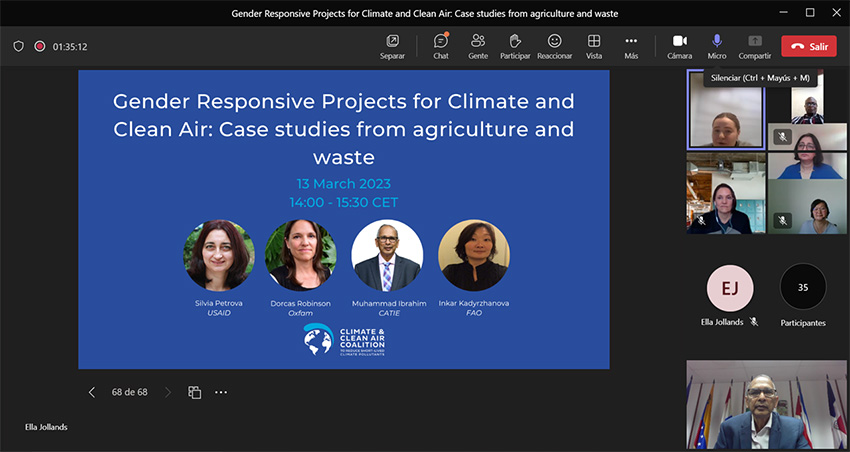Designing and executing agricultural projects with a gender perspective

March 13, 2023. The effects of climate change and air pollution can affect women and men differently, and understanding these differences is crucial to developing gender-sensitive agricultural projects and programs.
In 2022, Climate and Clean Air Coalition (CCAC) launched its first Gender Strategy to promote gender mainstreaming in climate and clean air action and has organized a series of webinars, kicking off on March 13 with a focus on practical gender guidance in project design. Project coordinators attended the webinar from non-governmental organizations (NGOs), national focal points and experts on air pollution and climate change. The event is part of a broader initiative to integrate a gender perspective into all CCAC-funded projects.
The activity began with the CCAC Secretariat presenting the new gender-focused components and continued with speakers from CATIE (Tropical Agricultural Research and Higher Education Center), the United States Agency for International Development (USAID) and OXFAM International.
On behalf of CATIE, Muhammad Ibrahim, Director General, gave a presentation on "designing and executing agricultural projects with a gender perspective", in which he highlighted the actions carried out by CATIE in the area of gender, both at the institutional level and in terms of the Graduate School, as well as in the work carried out in the field and other initiatives, for example:
- Gender training through field schools (ECA, its Spanish acronym) for producer families.
- Strengthening the entrepreneurial and associative capacities of women and youth.
- Gender-sensitive climate finance instruments.
- Strengthening and coordinating actions with local women's organizations.
- Supporting and incorporating research findings on transformative approaches to address gender-based constraints.
Ibrahim emphasized how some of the projects implemented by CATIE highlight positive results, such as the NAMA Facility and BioPaSOS, both projects developed in the area of sustainable livestock farming in Mexico and Central America, which involve training women in topics such as the establishment of silvopastoral systems, pasture management, plans for good farm management, among other topics in an industry historically dominated by men.
Ibrahim also pointed to the Mesoamerican Agro-environmental Program (MAP) as one of the flagship projects that trained 10,500 people, 51% of them women, in climate-smart agriculture through ECAs.



